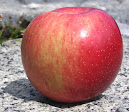 |
It's August already and we are up to the very fine Gravensteins.
Well into the harvest.
Personally I am not looking back, but it just hit me that today it is possible to eat super sweet varieties all year round and never have the joy of tart local fruit.
The supermarkets are full of year-old fruit, especially ubiquitous Honeycrisp at premium prices. People are buying them. Perhaps they eat nothing else.
Ever.
I am tolerant of others and celebrate following one's own tastebuds wherever they lead. My own personal tastes are nothing special.
Yet something about this is disconcerting.
If you want a vision of the future, imagine a tonne of sugar pouring down a human throat—forever.
—with apologies to Eric Arthur Blair
In an apple rut?
What to try if you like
Go on, they don't bite back!

It seems to me that when apples are being introduced every effort is made to put them out at their peak. Later on they are marketed all year and we are eating US grown when we should be eating NZ grown. This is particularly true for Braeburn and Jazz apples.
ReplyDeleteCathy, I didn't really see NZ (or Chile, etc) apples until June this year. Including some very disappointing Chilean Galas.
DeleteI'm grateful for the southern harvest, but all we see here is their sugary mass-market crop.
Ever tried ”Mantet”? Originally from Manitoba Canada the sead from the Russian Apple Tetofky. Really juicy with a hint of almond, the second apple to become ripe in the area around Stockholm, the first being Transparent Blanche
ReplyDeletehttp://www.rydlingeplantskola.se/wp/wp-content/uploads/Mantet.jpg
Hello, Carina, it is very nice to hear from you!
ReplyDeleteI have never had the pleasure of Mantet. And am always looking for new apples to try and write about here. Maybe this year!
Transparent Blanche is known here as White or Yellow Transparent. It is a lovely little apple, but seems to be only ripe for a very short time. Like so many early apples.